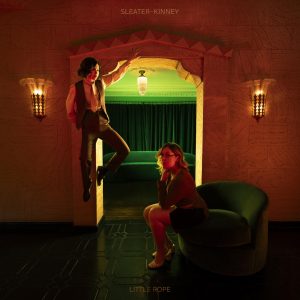Over the years Sleater-Kinney has been aptly praised by news outlets as “the best American punk band ever” going as far as “the best band in the world.” They return to Minnesota for a performance on March 23 at the Palace Theatre in St. Paul.
Carrie Brownstein, who sings and plays guitar alongside Corin Tucker, is a founding member of Sleater-Kinney. Brownstein gained notoriety outside of her music career while the band was on hiatus from 2005 to 2014 by starring in the IFC comedy series “Portlandia.”
After officially reuniting in 2014, Sleater-Kinney has released four new albums, the latest of which, their eleventh studio album “Little Rope,” released in January. At the end of February, they will begin to tour North America in support of the new release.
The Minnesota Daily spoke with Brownstein over Zoom ahead of Sleater-Kinney’s North American tour.
The Minnesota Daily: The “Little Rope” tour starts in just under a few weeks. I assume you guys are in the middle of rehearsals for that right now?
Carrie Brownstein: “Yes. Not in full production rehearsals, which means with our lighting director and monitor person, but we are rehearsing as a band on our own, prepping.”
Daily: Do you guys have a setlist for the tour figured out yet?
Brownstein: “We have a master list of songs. We generally know what we will be starting and ending the main set with. But we try to change things up every night and not get locked into one setlist. We’ve actually never done that as a band, so I think it helps us go along with the spirit of spontaneity and the live show.
But for the most part, there’s a list of about 40 songs and we’ll have all those rehearsed and be able to play 25 to 30 of those a night.”
Daily: I wanted to talk about the musical direction of “Little Rope.” In 2019 with your guys’ ninth album, “The Center Won’t Hold,” it felt like there was a big shift musically from “No Cities to Love.” Then in 2021, with the album “Path of Wellness,” it felt like a shift back to the “No Cities to Love” sound. With “Little Rope,” it feels like you guys are picking up where “The Center Won’t Hold” left off musically. What was the creative process behind that like?
Brownstein: “I think ‘Little Rope’ conjures a lot of what is both foundational and fundamental about Sleater-Kinney but also is an expression of the experimentation that we’re interested in. We don’t really have a purist mindset about the band in terms of instrumentation, but I think ‘Little Rope’ is a fairly guitar-driven album, probably more so than ‘Center Won’t Hold.’
To me, ‘Center Won’t Hold,’ I think it sounded like more of a deviation to other people than it did to me. Like when I go back and listen to our earlier records, which I do a lot when we’re prepping for tour, I can hear us trying to do things that we have done more recently, but we didn’t have the producer or we didn’t have the instrumentation or we didn’t allow ourselves the freedom to transpose a guitar line onto a synthesizer. I hear in ‘All Hands on the Bad One’ a lot of pop music, and even on ‘Dig Me Out,’ a song like ‘Little Babies’ has a very catchy chorus –– I sort of hear these earlier iterations of that.
To me, ‘Little Rope’ just kind of encompasses all of those efforts, but also, I think, has some more dynamic songwriting and certainly I think Corin is doing something with her voice that she wasn’t able to do necessarily on the older records. She has so much control now, she can go to the really high, dramatic notes but she can also hold back. I think that restraint is what was introduced on ‘Center Won’t Hold’ to be honest.”
Daily: The big thing that stuck in my mind comparing “Center Won’t Hold” and the new album is the use of distortion and synths. I see those elements coming back in on this record and I think that’s really cool.
Brownstein: “Yeah it’s interesting, you’re one of the first people to bring that up, which is good because it’s good to have to think of something in a different way for a second. I do see a throughline between John Congleton, who obviously produced St. Vincent, and then St. Vincent produced ‘Center Won’t Hold,’ and I think they share a little bit of a lexicon musically. They love to run things directly into the board and sort of blow things out with the on board gear as opposed to using an amplifier and micing an amp. I think you get that really close-up guitar sound, which can be very jarring and corrosive in a way that micing an amp doesn’t have, so I think there probably is a shared sonic language between St. Vincent and Congleton. Corin and I are, of course, not averse to growly, disgusting guitar sounds either.”
Daily: I wanted to touch on the title of “Little Rope,” which is from a lyric on the song “Small Finds.” Tell me how you guys settled on that name for the record and what it means within that context.Brownstein: “I think so much of this record deals with oppositional forces and dualities and themes and motifs that conjure the in-between and the liminal. I think we wanted something that could be perceived both as darkness and despair but also hopeful at the same time.
To me ‘Little Rope’ could mean a dark dire moment that feels like you want to end it all, but it could also be what’s handed to you as a means of escape or safety or getting out of that treacherous situation. I think we just wanted a title that could hold those multiple meanings.”

Daily: For Sleater-Kinney album covers, this one stands out to me because you’re floating on it. It feels like there’s an element of fantasy that’s not present on the other album covers. I was wondering what the intention behind the album cover was?Brownstein: “We worked with the art directors and photographer Sophia Nahli Allison. We were drawn to her work because of the way she places bodies in interiors and in space. They often are defying gravity or pushing against the expectation of what a body is capable of. Often through the physicality it is conveying something more emotional or speaking to the discomfort, I think, of the ways that bodies move through spaces or speaking to an interior discomfort by putting people in kind of awkward positions. We liked that, we liked the other-worldly, you’re using the word magical, I think of it a little more other-worldy but I get it, I think magical is fine as well. The ability to both transcend but also to be stuck and I think, again, playing with the two sides of something. So we were interested in the doorway, the archway, as the idea of an ‘out,’ the idea of in between. I think because the album is dealing with a lot of uncertainty, thematically, we wanted something that felt like it was on a precipice, between two worlds, between two emotional states, between a before and an after I guess.
So yeah, I am stuck on that wall. I actually don’t mind that I’ve seen comments that are like, ‘What is this Matrix thing?’ or ‘What We Do in the Shadows,’ that’s okay for me. It can get into that weird magical realism zone that is rare for Sleater-Kinney but I don’t mind.”
Daily: Earlier you mentioned the album “All Hands on the Bad One” and how it delved into pop. How much of a priority were hooky-ness and pop elements in songs on the new album?
Brownstein: “I think my trajectory as a fan involved dipping into punk, including hardcore and avant-garde and post-punk and things that eschew melody. But I grew up in the ‘80s which was just drenched in pop music, it was one of the peak eras of pop, you know, Michael Jackson, Prince, Madonna, some of the best there ever were at making pop music. I can’t deny that influence on me and then, of course, punk came and was a wrecking ball and all that. But I realize that what has stuck with me from punk and new wave is catchiness.
So most of what is indelible to me and what lives on is a sense of melody. Melody to me is what I return to, but it’s not the only thing. I love dissonance, I like moments that are sour and bittersweet and even aggressive or ugly, but I like contrasting that with something that is melodic and mellifluous. So I think it’s in the DNA of this band but I think that we have more control over that now. Like we were talking about earlier, I can listen to our early records and hear the catchiness, I think that’s part of the reason Sleater-Kinney has fans, we have songs that are catchy, they’re not just punk with nothing to sing along to –– like you’ve always been able to sing along to Sleater-Kinney.”
Daily: How do you feel about the debut Sleater-Kinney album now almost 30 years later?
Brownstein: “I give credit to our fans for helping me reassess the first Sleater-Kinney album. Because what’s great about the modern era of music is that it is such a conflation of time. There is really nothing to differentiate a new and an old song except when it was placed onto the internet. And in some cases old music is placed onto the internet after, like we’ve done away with chronology and I think what that fosters is a revaluation and reassessment both for an audience and as the maker of that music.
So for a long time I always thought of our first album as something that is kind of inchoate or just had this partial up-start quality to it. And, sure, if you measure it against ‘The Woods’ or ‘No Cities to Love’ or ‘Little Rope,’ it probably does, there’s something rudimentary about it. But I think I now appreciate what we were trying to do, and I also appreciate the interplay of the guitars, I think I have just learned to sort of value it. There’s a sweetness there, there’s a real heart-on-sleeve honesty in those songs. When we’ve posted things on Instagram and asked for comments and people suggest the first album as songs to play, we went back and re-learned some of those early songs to play on tour.
I think I am less likely to distance myself from that than I would have been a decade ago. I think it’s that appreciation that contemporary audiences, particularly young audiences, have for the totality of a band but also not seeing it in sequence. It’s randomized, and they’ll listen to something called ‘Slow Song’ off the first record and they’ll listen to ‘Say it Like You Mean It’ and I love that. I think that’s, to me, why I just would never malign the new fans, in fact, I am grateful for the new and young fans because I think I am able to see us through their eyes in a way that is very encouraging and inspiring.”
Sleater-Kinney plays at the Palace Theatre on March 23 with supporting act Black Eagle Scout.
This interview has been edited for clarity, grammar and length














